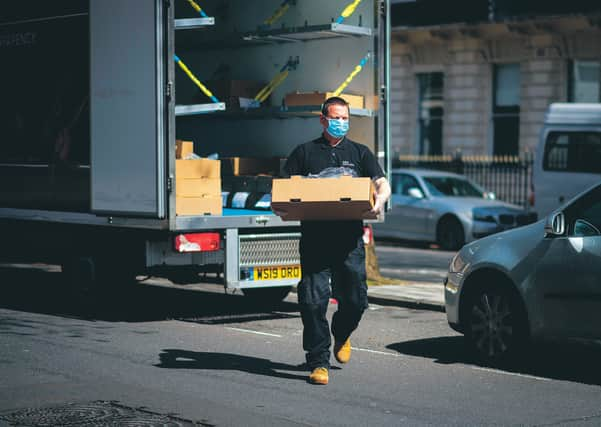Bill Jamieson: When it comes to recovery, we’re all on the front line


Looking at all the essential services that have been sustained in the face of this deadly contagion – doctors, carers, paramedics, hospital builders, truck and bus drivers, delivery staff, cleaners, ambulance teams, food shop assistants, food packers, mobile food van providers, police, farm workers, bin men and an army of volunteers who have stepped forward to give help – there is no “front line” of vital services: millions are now in the front line.
It is tempting to despair at the prospect of a prolonged lockdown and faltering recovery. But the past two months have shown how the impossible can be achieved – from those emergency Nightingale hospitals to the delivery of food to the housebound. In the response to this tragic pandemic and the way in which so many have responded are the seeds sown for national recovery.
Advertisement
Hide AdAdvertisement
Hide AdFor this reason, I do not share the pessimism of some of a faltering and chaotic recovery, though the immediate prospect is grim. The priority, for now, is to get immediate cash help for tens of thousands of small and medium-sized businesses and the myriad of self-employed workers for whom state help announced by government has still to arrive. Government departments have struggled to cope with the deluge of applications – another critical front line in this pandemic.
In the course of the past few weeks, the toll of economic devastation has mounted. The EY ITEM Club expects GDP to contract by 5.8 per cent over 2020. But estimates of the slump in GDP do not begin to capture it – it is at the micro-level, with hundreds of thousands of businesses fighting for survival, that the havoc is more grimly captured.
UK services activity declined at a record rate in March. The final services Purchasing Managers Index has been revised down to 34.5 against a reading of 53.2 in February – by far the lowest reading in the survey’s more than 23-year history. It was also the sharpest monthly drop on record. All elements of the services survey showed a marked deterioration in March. New business contracted at the fastest rate since the survey began in 1996, while confidence also deteriorated to a record low and jobs were cut at the fastest rate since June 2009.
By far the steepest downturns in activity were signalled by hotels and restaurants and other leisure activities such as sports centres, gyms and hair salons.
The initial impact of emergency public health measures, reports EY economist Howard Archer, “was also reflected in record downturns in activity across transport and travel and the vast business-to-business services category”.
Construction activity across the UK has collapsed at its fastest rate since the immediate aftermath of the financial crisis in April 2009. All construction sectors contracted last month – with commercial and civil engineering activity both contracting the most for 11 years, while house building also declined.
The PMI also revealed that new business slumped at the second-fastest rate (after last August) for 11 years, while confidence in the sector was at the weakest level since October 2008.
Meanwhile, new car sales across the UK fell last month by 44.4 per cent, with 203,370 fewer new cars sold in March than a year ago. The decline was widespread with private sales falling 40 per cent year-on-year, while fleet sales were down 47 per cent.
Advertisement
Hide AdAdvertisement
Hide AdNor has Scotland been let off lightly. A new report from the respected Fraser of Allander Institute warns that the economy in Scotland could contract by up to a quarter if the current lockdown restrictions continue for a three-month period.
It said there was likely to be a “long road to recovery” from the “unprecedented” economic impact of coronavirus, predicting that the construction sector could contract by 40-50 per cent, production by 25-30 per cent and services by 15-20 per cent.
It also warned that it “might be many months or even years before we actually know the full extent of the effect of the shutdown on the Scottish economy”. Within the production sector, the collapse in the oil price has had a severe impact on mining and quarrying, while electricity and gas supply has seen a decline in demand of roughly 10 per cent. In construction, the researchers said they were seeing “a shutdown in much of the housebuilding industry, and the mothballing of a large part of private construction infrastructure and repair”.
Services, which is by far the largest part of the Scottish economy, will take a hit in retail and wholesale, transport and storage, and accommodation and food services, with the majority of the latter sector currently mothballed.
The report concluded: “Of course, many of these effects will be temporary. Once restrictions are gradually lifted, then we should see some of these sectors bouncing back. To what extent, we don’t yet know. It is likely to be a long road to recovery.”
The Scottish Government last week published the legislation and guidance which brings in 100 per cent rates relief for retail, hospitality and leisure premises for the next few months. The guidance also confirms that State Aid constraints will not be applicable for this relief. Good news – but many businesses are now on their knees with no money coming in and overheads still having to be paid.
Immense challenges now have to be faced as the lockdown persists. But such is the pent-up demand when it is lifted that the torrent of orders will soon be felt right along the supply chain. While many products and services will take many months to recover, there will be a spring-back for many as the pandemic abates and confidence starts to recover after this epochal shock. It cannot come soon enough.